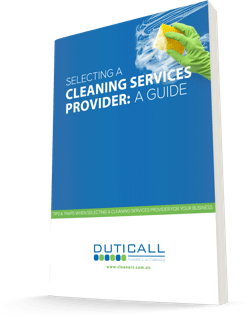Making home cleaning easier – tips from the Office Cleaning team…..
We clean office and industrial facilties in South East Queensland and enjoy sharing articles for the commercial community but we will also share tips and advice occasionally for home cleaning for our clients, friends of Duticall and any other ‘cleaning buffs’.
Cleaning at home can be a real chore but with the right tools it can certainly be quicker, easier and more effective.
An international cleaning organisation (IICRC, Inspection Cleaning and Restoration Certification, www.iicrc.org) recently published a list of eight tools to keep on hand for domestic cleaning.
But before cleaning, find a cleaning caddy that you can use to keep your cleaning tools and equipment on hand.
With the caddy in hand, consider the following tools and products to make the most of your cleaning efforts:
- Microfibre cloths and water. Good quality microfibre is one of the best cleaning tools you can use. Microfibre has magnetic qualities and when used in concert with water, you can readily remove many soils from the surface. This combination is also great for cleaning natural stone surfaces as it limits opportunity for damage, etching or discoloration.
Cleaning tip – remove the soil before you disinfect
- A damp and dry cloth. It’s a good rule of thumb to always dry any surface that you wet. This helps guarantee that you remove dirt instead of just moving it around. If you’re using a lightly dampened microfibre, its qualities allow you to clean without streaking and often allow you to skip the drying step.
- A scrub sponge or a scrubbing microfibre cloth. For surfaces with hard or embedded dirt, use a white or non-scratch sponge. Avoid abrasive sponges, as these may scratch surfaces. Because sponges may harbor germs, it’s a good idea to use a different sponge in the kitchen and the bathroom. If you are using microfibre, you can colour-code for each space; microfibres are also easier to launder (but not with other fabrics).
- A plastic spatula or cleaning knife. To clean tough-to-reach areas, wrap cleaning cloth around a plastic or metal spatula to remove dirt without scratching the surface. This can be particularly effective for cleaning grime and buildup on louvers and around the edges of a sink or stovetop.
- A toothbrush. Rather than repurpose an old, used toothbrush to agitate the surface and loosen dirt in tight spaces, such as between tap handles or around other household knobs, invest in a toothbrush designed specifically for cleaning or similar. This tool will have stronger bristles to remove dirt more effectively.
- A razor. A razor can be a useful tool for removing materials on appropriate hard surfaces. Always test first and make sure the surface is wet and the razor is clean and blemish-free. Hold it at an acute angle to move across the surface. Never use it at a vertical angle. A razor will eliminate the need to intensively scrape the surface, saving time and elbow grease.
- Cleaning chemicals. A general purpose and tile cleaner are two primary cleaning chemicals you can use for any deep cleaning project. Particularly effective in bathroom areas.
Cleaning tip – always utilise chemicals as per the instructions and consider a applying chemicals in a test area if you have not used it before or are unsure if it is appropriate
- A plastic bag. Equip your cleaning caddy with a plastic bag for collecting debris and small pieces of trash. This can save you steps and help keep your caddy clean.
For more Cleaning Tips you can apply to your home or office environment check out Cleaning 101 from the Pros.
If you need any other advice or assistance for your office cleaning in greater Brisbane don’t hesitate to contact the team at Duticall.


